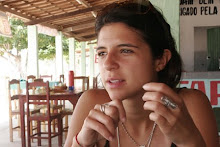I love bananas but I hardly ever eat them. Let me explain. I have spent most of my time outside of Brasil since 1997. This time has been spent in so-called "developed" nations - either the United States, Spain, and lately, Italy. These are not banana-producing nations. However, there is no scarcity of bananas in these countries. I have never walked into any supermakert in the US or Europe that didn't have bananas in stock. They are everywhere. I suppose this is because the banana is the ultimate fruit for people "on the go." They come with their own "easy-open" packaging, and are easy to eat. Eating a banana is a tool-and-mess-free process. Compare that to eating a mango, or a pineapple.
Although ever present in my life away from home, I refuse to eat bananas and that is because, simply put, they suck. It's true. They do. These perfectly yellow spotless bananas are mass produced in places like Costa Rica, Hawaii, and Jamaica. Once the little bananas pop up, the whole set is placed inside a plastic bag, which is supposed to make them mature faster. I have seen this in Costa Rica and it made me sick. Entire massive fields of banana plants covered in blue plastic. These are then picked way too soon, green as can be. Then they undergo other processes that we may never really know about before they get to the supermakert shelves and to our home. As a result of the manner in which these fruits are produced, the bananas have practically no flavor and the texture is unbearable to me.
The thing is, most people who consume these fruits were born and raised in countries where these fruits cannot grow. So, we can assume that most of these consumers have probably never eaten what I (and many other people from the tropics) consider a great banana. I often feel sorry for them when I see them select these sad sad fruits at the supermarket. I imagine some of these people will take these fruits with them to work and eat them during the highly expected lunch break. Oh man, what a sad snack that is.
Let me share some tips about bananas.
Real bananas are at their peak of deliciousness when they are almost too ripe. The sugars add up, the flesh starts to become soft, and the peel has darkening spots. I don't know any brasilian person who would consider a completely yellow banana to be a good thing. Oh no! We don't eat those. We look for the ones with the spots. You can judge the ripeness of a banana (and its sugar content) by the spots and the softness. Another tip: if you would like to cook with bananas in, say, a banana bread, wait for them to ripen. Then, when they are really ripe (I mean, soft, dark... look for these signs) freeze them. When you are ready to bake, defrost them by simply leaving them on the counter and you're ready to go. I have found that more of the flavor comes out this way.
For those of us who have (sadly) never had the amazing pleasure of eating a real banana, please consider this fruit the next time you think about booking a vacation. Once you have eaten delicious, travel-free bananas, you will never look at another banana the same way. I promise.









